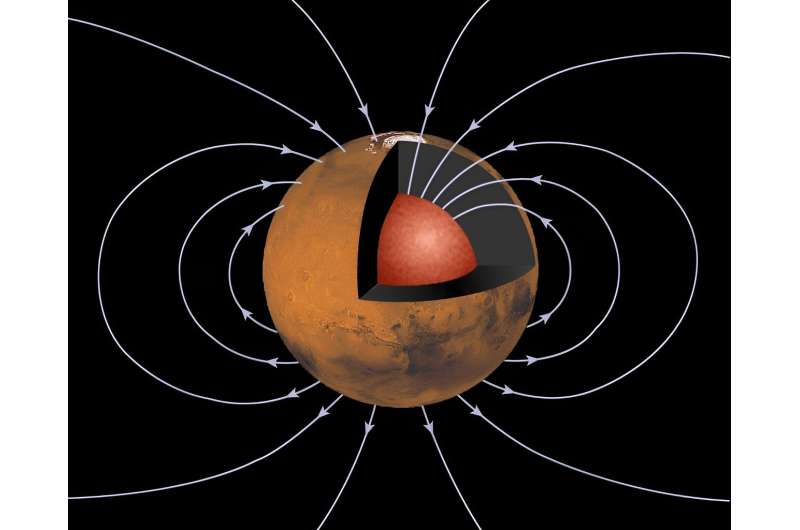
A recent study published in The Planetary Science Journal examines how helicopters equipped with a magnetometer could be used to conduct magnetic field investigations within the crust of Mars, providing important insights into the present characteristics and early evolution of the red planet.
This study comes as NASA’s Ingenuity helicopter continues breaking records and making history as the first powered aerial explorer on another planet, along with the recently expired NASA InSight lander using its own magnetometer to measure the crustal magnetic field.
Additionally, outside of small areas on the Martian surface that exhibit magnetized crust, the red planet does not currently possess a global magnetic field, which scientists hypothesize is in stark contrast to what Mars was like billions of years ago. This study builds upon global magnetic field measurements conducted by several orbiters, including the Mars Global Surveyor, the Mars Atmosphere and Volatile Evolution (MAVEN) spacecraft, and the recent Chinese Tianwen-1 orbiter, along with localized measurements from the InSight lander, as well.
“A planet’s global magnetic field (like the Earth’s) is driven by vigorously convecting iron in the core and is thus an expression of what is happening deep inside a planet,” Dr. Anna Mittelholz, who is a Daly Postdoctoral Fellow in the Department of Earth and Planetary Sciences at Harvard University and lead author of the study, tells Universe Today.
“The global field is linked to important processes such as ways for an atmosphere to escape from a planet, and thus a pretty fundamental characteristic of a planet. While planets like the Earth and Mercury have a global field, Mars or even the moon used to have one (not anymore)—and we do not even fully understand the diversity across our solar system.”
For the study, Dr. Mittelholz and her team developed magnetization models and evaluated three proposed scenarios for how future helicopters on Mars could take measurements of magnetized Martian crust from both the air and periodic landings. These scenarios included a magnetized crater, individually magnetized crustal layers, and a magnetized dike intrusion, which is where an old surface fracture has been filled in with magma. Goals for the study included gaining a better understanding of the origin and evolution of Mars and how such data can also be used to aid in future human exploration of the red planet as well.
“You can think of the problem as, for example, a big, magnetized magma chamber in the subsurface,” Dr. Mittelholz tells Universe Today. “With a helicopter, one measures a magnetic field signature flying across it but likely not covering all of it. Now we attempt to go from data collected along the path to building a model on how the subsurface looks like.”
In the end, the scenarios determined that while measurements conducted through landings proved effective, measurements conducted from the air provided better data. They determined that data collected from the air should be collected when magnetic field activity is at its quietest, either during daytime or nighttime. They also found that past localized magnetic field data collected from NASA’s InSight lander along with additional data regarding geochemistry, gravity, and/or geology could also assist in future endeavors with a helicopter, as well.
Dr. Mittelholz tells Universe Today, “Obviously before we go to Mars, we should think about questions like how many times do I need to traverse over a magnetized feature so that I can successfully recover it? How should my flight path look like? And more technical aspects: What techniques are most powerful in recovering certain features?”
The human exploration aspect of the study specifically pertained to using the crustal magnetic field data for identifying iron-bearing resources along with examining how magnetic field shielding could protect future astronauts from solar and cosmic radiation. This is because a lack of a Martian global magnetic field means future astronauts will be exposed to levels of radiation far higher than on Earth, or even orbiting in the International Space Station.
While Mars does not currently possess a global magnetic field, scientists hypothesize that things were very different billions of years ago after its formation. During this time, the internal processes of the red planet were far more active which allowed for a global magnetic field to shield the atmosphere and surface from harmful solar radiation, resulting in the much more hospitable environment, including liquid water to flow across the surface. However, scientists hypothesize that approximately 4 billion years ago when the convection within the Martian core ceased, it took the magnetic field and atmosphere with it, dooming the red planet to an eternity of no liquid water and extreme cold.
More information:
Anna Mittelholz et al, Exploring Martian Magnetic Fields with a Helicopter, The Planetary Science Journal (2023). DOI: 10.3847/PSJ/ace9c1
Provided by
Universe Today
Citation:
Helicopters could map the magnetic fields on Mars (2023, September 18)
retrieved 20 September 2023
from https://phys.org/news/2023-09-helicopters-magnetic-fields-mars.html
This document is subject to copyright. Apart from any fair dealing for the purpose of private study or research, no
part may be reproduced without the written permission. The content is provided for information purposes only.





